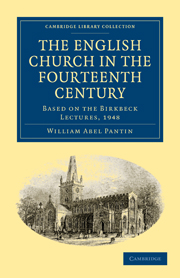Book contents
- Frontmatter
- Contents
- Preface
- List of Abbreviations
- I INTRODUCTION: THE LEGACY OF THE THIRTEENTH CENTURY
- PART I CHURCH AND STATE
- PART II INTELLECTUAL LIFE AND CONTROVERSY
- PART III RELIGIOUS LITERATURE
- Appendix I The Latin text of passages quoted from manuscript sources
- Appendix II Two collections of didactic treatises
- Index
Appendix II - Two collections of didactic treatises
Published online by Cambridge University Press: 10 November 2010
- Frontmatter
- Contents
- Preface
- List of Abbreviations
- I INTRODUCTION: THE LEGACY OF THE THIRTEENTH CENTURY
- PART I CHURCH AND STATE
- PART II INTELLECTUAL LIFE AND CONTROVERSY
- PART III RELIGIOUS LITERATURE
- Appendix I The Latin text of passages quoted from manuscript sources
- Appendix II Two collections of didactic treatises
- Index
Summary
In addition to the manuals for priests and the vernacular treatises described in Chapters ix and x, attention should be drawn to a certain class of manuscripts, namely miscellaneous collections of short didactic treatises, which were very popular in the later Middle Ages. Two examples, out of many, will illustrate the type of compilation that I have in mind.
(i) British Museum, MS. Burney 356. This is a remarkable compilation known as the Flos florum, written at the beginning of the fifteenth century, and containing twenty-two ‘books’ or treatises of various dates and authorship (there was formerly a twenty-third which has now disappeared). Some of these are devotional treatises such as the Meditations ascribed to St Augustine, St Anselm, and St Bernard, Innocent III's De miseria humanae conditionis, Richard Rolle's Emendatio vitae; but nine of the treatises form part of the literature of religious instruction. They are as follows:
Book I, fo. 8. A treatise on the Lord's Prayer, which also deals with the seven Gifts of the Holy Ghost, the seven sins, the seven virtues, the seven beatitudes: ‘Per istas vii peticiones impetrantur vii dona Spiritus Sancti, que extrahunt a corde hominis vii peccata mortalia, et plantant in corde hominis vii virtutes principales, que nos perducant ad vii beatitudes et eorum merita’ (fo. 9v).
- Type
- Chapter
- Information
- The English Church in the Fourteenth CenturyBased on the Birkbeck Lectures, 1948, pp. 277 - 280Publisher: Cambridge University PressPrint publication year: 2010First published in: 1955



